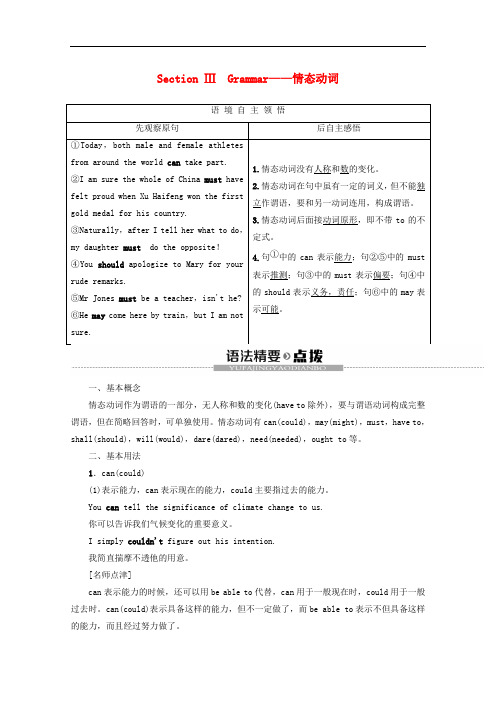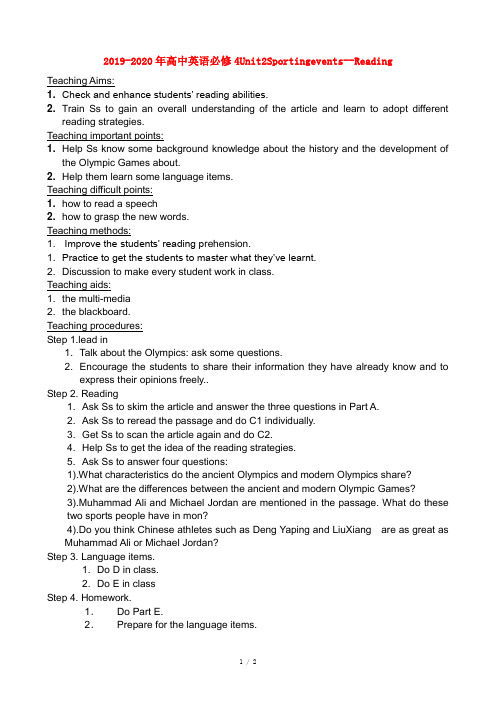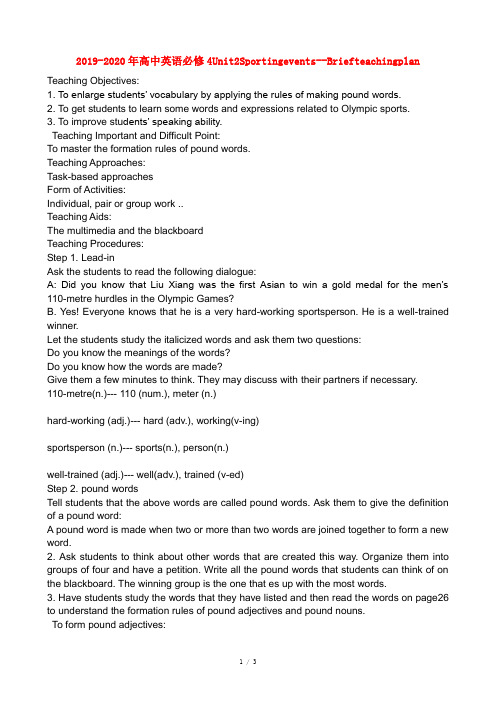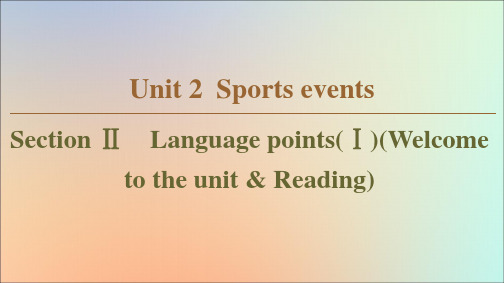2019-2020学年高中英语 Unit 2 Sporting events 课时跟踪检测(四)牛津译林版必修4
2019-2020学年高中英语 Unit 2 Sports events Section Ⅲ G

Section ⅢGrammar——情态动词一、基本概念情态动词作为谓语的一部分,无人称和数的变化(have to除外),要与谓语动词构成完整谓语,但在简略回答时,可单独使用。
情态动词有can(could),may(might),must,have to,shall(should),will(would),dare(dared),need(needed),ought to等。
二、基本用法1.can(could)(1)表示能力,can表示现在的能力,could主要指过去的能力。
You can tell the significance of climate change to us.你可以告诉我们气候变化的重要意义。
I simply couldn't figure out his intention.我简直揣摩不透他的用意。
[名师点津]can表示能力的时候,还可以用be able to代替,can用于一般现在时,could用于一般过去时。
can(could)表示具备这样的能力,但不一定做了,而be able to表示不但具备这样的能力,而且经过努力做了。
Can you come to the party tomorrow?明天你能来参加聚会吗?He was a good swimmer so he was able to swim to the riverbank when the boat sank.他是一个很擅长游泳的人,所以当船下沉时,他能够游到河岸上。
(2)表示请求许可。
当请求允许做某事时,两者均可用,但用could语气更委婉。
当表示允许某人做某事时,一般要用can,而不用could。
—Can/Could I use your bike tomorrow morning?—Yes,you can./No.I'm afraid not.——我明天早晨能用你的自行车吗?——是的,可以。
2019-2020年高中英语 Unit2 Sporting events-grammar教案 牛津译林版必修4

2019-2020年高中英语 Unit2 Sporting events-grammar教案牛津译林版必修4Step 1: General introductionStep 2: Practice1. Now look at the blackboard,I’d like you to explain the meanings of the different modal verbs used in this sentence:I might/may/could/should/ought to/will/must watch the TV programme tonight.When might is used, it shows that the speaker is uncertain whether he or she will do something.When may is used, it shows that the speaker is s bit more certain than when might is used.Could is more certain than may, but less certain than should and ought to. Should and ought to are more certain.When we use will, we mean we are quite certain that we will do something.If we use must, we are almost certain to do something.2. If you want to have a look at your friend’s book, what do you say? (Can I havea look at your book?)What does your friend say to you? (‘Of course, you can.’ Or ‘sorry/No, you can’t) So can is also used to ask for permission, especially in informal or spoken English.3.Now read Part 1 on page 28 to find out how modal verbs are used to talk about ability, obligation, certainty and permission. Pay attention to the three arrows that illustrate the degrees of obligation, certainty and permission when modal verbs are used.4. Read part 2 and use modal verbs to make requests, suggestions or offers, and give advice. e.g.:Will/Can you read the sentence once more? (To make a request.)Shall we watch a film tonight? (To make a suggestion)I will help you if you have any problems (To make an offer)The manager is not in now. You should e back at three o’clock (To give advice) 5. Now please read the instructions for the exercise on page 29. Then plete the articleindividually and I will check the answers later.(1) must (2) has to (3) must (4) must (5) should (6) ought to (7) could(8) may (9) could6. Read Part 4 on page 28 and try your best to understand why the continuous form or the perfect form is used with a modal verb in the example sentences. First I’ll give you some examples:John isn’t here to attend the party. He must be reviewing his notes for the big exam tomorrow. (The speaker thinks that John is reviewing his notes now.)Tom knows nothing about the subject. He can’t have been at the lecture yesterday. (The speaker is sure that Tom did not go to the lecture yesterday.)The money is gone. Who could have taken it? (The speaker does not know who has taken the money.)Step 3: parison of some pairs of model verbs1. Read Part 1 on page 30 and find the differences between can and be able to . ·Be able to is more formal and less mon than can when referring to ability.·Be able to can be used in different tenses or after other modal verbs, for example, will /shall be able to , would/should be able to , have/has /had been able to, must/may/might be able to .·Be able to can be used after the infinitive marker to .·The past form of be able to is was/were able to .·Can is more mon and informal than be able to when referring to ability·Cancan be used to talk about a possible future action.·The past form of can is could .Now please make some sentences with be able to and can , using different tenses, or after modal verbs or in a to-infinitive.2. Read Part 2 and then plete the chart below.Make some sentences using shall or will.Let’s plete the dialogue ( Part B on page 31), and then read the dialogue in pairs to check your answers.B (1) Shall (2) shall (3) will (4) will/shall (5) will (6)will/shall (7) shall/will3.Read Part 3 which explains the use of mustn’t and needn’t and then make sentences4. Read Part 4 which explains when to use need or dare as modal verbs5. Read the instructions for Part A on page 31, and then plete the passage.A (1) can (2) dare (3) can/could (4) may/might/could(5) mustn’t/shouldn’t/can’t (6) mustn’t/shouldn’t/can’t (7) can(8)needn’tStep 4: ConsolidationI. Relative items in recent years’ college entrance examination1. I was really anxious about you. You home without a word.A. mustn’t leaveB. shouldn’t have leftC. couldn’t have leftD. needn’t leave2. --Is John ing by train?--He should but he not. He likes driving his car.A. mustB. canC. needD. may3. How you say that you really understand the whole story if you have coveredonly part of the article? A. can B. mustC. needD. may4.“The interest be divided into five parts, according to the agreement madeby both sides,”declared the judge.A. mayB. shouldC. mustD. shall5. --I’ll tell Mary about her new job tomorrow.--You her last week.A. ought to tellB. would have toldC. must tellD. should have told6. --Excuse me, is this the right way to the Summer Palace?--Sorry, I am not sure. But it be.A. mightB. willC. mustD. can7. I pay Tracy a visit, but I am not sure whether I will have time this Sunday.A. shouldB. mightC. wouldD. could8. --I don’t mind telling you what I know.--You .I’m not asking you for it.A. mustn’tB. may notC. can’tD. needn’t9. --Isn’t that Ann’s husband over there?--No, it be him. I’m sure he doesn’t wear glasses.A. can’tB. must notC. won’tD. may not10. Children under 12 years of age in that country be under adult supervision when in a public library.A. mustB. mayC. canD. need11. --Who is the girl standing over there?--Well, if you know, her name is Mabel.A. mayB. canC. mustD. shall12. You might just as well tell the manufacturer that male customers not like the design of the furniture.A. mustB. shallC. mayD. need13. --Mum, I’ve been studying English since 8 o’clock. I go out and play with Tom for a while?--No, I’m afraid not. Besides, it’s raining outside now.A. Can’tB. Wouldn’tC. May notD. Won’t14. A left-luggage office is a place where bags _____ be left for a short time, especially at a railway station.A. shouldB. canC. mustD. will15. I often see lights in that empty house. Do you think I _____ report it to the police?A. shouldB. mayC. willD. can16. I have lost one of my gloves. I it somewhere.A. must dropB. must have droppedC. must be droppingD. must have beendropped17. He _____ have pleted his work; otherwise, he wouldn’t be enjoying himself by the seaside.A. shouldB. mustC. wouldn’tD. can’t18.Tom, you leave all your clothes on the floor like this!A. wouldn’tB. mustn’tC. needn’tD. may not19. - I hear you’ve got a set of valuable Australian coins. ____ I have a look?-Yes, certainly.A. DoB. MayC. ShallD. Should20. My English-Chinese dictionary has disappeared. Who ____ have taken it.A. shouldB. mustC. couldD. wouldII. Translation1. 我相信当刘翔赢得男子100米跨栏金牌时,所有的亚洲人都一定非常自豪。
2019-2020年高中英语必修4Unit2Sportingevents--Reading

2019-2020年高中英语必修4Unit2Sportingevents--ReadingTeaching Aims:1. Check and enhance students’ reading abilities.2. Train Ss to gain an overall understanding of the article and learn to adopt differentreading strategies.Teaching important points:1. Help Ss know some background knowledge about the history and the development ofthe Olympic Games about.2. Help them learn some language items.Teaching difficult points:1. how to read a speech2. how to grasp the new words.Teaching methods:1. Improve the students’ reading p rehension.1. Practice to get the students to master what they’ve learnt.2. Discussion to make every student work in class.Teaching aids:1. the multi-media2. the blackboard.Teaching procedures:Step 1.lead in1. Talk about the Olympics: ask some questions.2. Encourage the students to share their information they have already know and toexpress their opinions freely..Step 2. Reading1. Ask Ss to skim the article and answer the three questions in Part A.2. Ask Ss to reread the passage and do C1 individually.3. Get Ss to scan the article again and do C2.4. Help Ss to get the idea of the reading strategies.5. Ask Ss to answer four questions:1).What characteristics do the ancient Olympics and modern Olympics share?2).What are the differences between the ancient and modern Olympic Games?3).Muhammad Ali and Michael Jordan are mentioned in the passage. What do thesetwo sports people have in mon?4).Do you think Chinese athletes such as Deng Yaping and LiuXiang are as great asMuhammad Ali or Michael Jordan?Step 3. Language items.1. Do D in class.2. Do E in classStep 4. Homework.1.Do Part E.2.Prepare for the language items.1 / 2Period 2 Language FocusTeaching aims:1. To understand new words, phrases and sentence patterns in the reading passage;1.To learn how to use them.Teaching Important Points:1. To help the students to understand the text better.2. To help the students master the use of some important language points.Teaching Difficult Points:1. The usage of some words, phrases and sentence patterns.Teaching Procedures:Step 1.Lead-inDiscuss the following questions:1.Do you think the Olympic Games help countries and people live peacefully side by side?2.Who do you think are the greatest Olympic athletes and why?3.What kind of example do you think athletes like Liu Xiang and Muhammad Ali have set for young people around the world?Step 2 Words and phrases to be learnedDelighted, significance, briefly, pete, allow, honourable, no matter what, separate, side by side, light, be recognized as, record, contribution, absence, attemptStep 3 PracticeDo PartA1and A2 on page98Step 5 Assignments:1. Keep in mind the useful words, phrases and sentence patterns and know how to use them.2. Finish some additional exercises温馨提示:最好仔细阅读后才下载使用,万分感谢!。
2019-2020年高中英语必修4Unit2Sportingevents--Briefteachin

2019-2020年高中英语必修4Unit2Sportingevents--BriefteachingplanTeaching Objectives:1. To enlarge students’ vocabulary by applying the rules of making pound words.2. To get students to learn some words and expressions related to Olympic sports.3. To improve stu dents’ speaking ability.Teaching Important and Difficult Point:To master the formation rules of pound words.Teaching Approaches:Task-based approachesForm of Activities:Individual, pair or group work ..Teaching Aids:The multimedia and the blackboardTeaching Procedures:Step 1. Lead-inAsk the students to read the following dialogue:A: Did you know that Liu Xiang was the first Asian to win a gold medal for the men’s 110-metre hurdles in the Olympic Games?B. Yes! Everyone knows that he is a very hard-working sportsperson. He is a well-trained winner.Let the students study the italicized words and ask them two questions:Do you know the meanings of the words?Do you know how the words are made?Give them a few minutes to think. They may discuss with their partners if necessary.110-metre(n.)--- 110 (num.), meter (n.)hard-working (adj.)--- hard (adv.), working(v-ing)sportsperson (n.)--- sports(n.), person(n.)well-trained (adj.)--- well(adv.), trained (v-ed)Step 2. pound wordsTell students that the above words are called pound words. Ask them to give the definition of a pound word:A pound word is made when two or more than two words are joined together to form a new word.2. Ask students to think about other words that are created this way. Organize them into groups of four and have a petition. Write all the pound words that students can think of on the blackboard. The winning group is the one that es up with the most words.3. Have students study the words that they have listed and then read the words on page26 to understand the formation rules of pound adjectives and pound nouns.To form pound adjectives:A B1.black a. room2.broad b. eyed3.every c. cast4.bed d. case5.blue e. where6.suit f. board. 7.radio g. ground8.bus h. throw9.reading i. driver10.passer j. by11.play k. paper12.over l. active13.news m. room5. Ask the students to translate the words into Chinese. Explain that some English words are derived from the bination of two different words, for example:hand-bag: a small bag carried on a person’s hand;long-lasting: that can last for a long time;tea-cup: a cup that contains tea;three-day: lasting for three days;sightseeing: the activity of seeing sights as a tourist.6. Ask the students the following questions:When you e across unfamiliar words, do you often use the knowledge of word formation to guess the meaning of the new word? If so, can you think of some examples?7. Ask the students to put the following into English:1.项链2.雨衣3.男朋友4.聚会5.书店6. 地震7.消防队员8.气象员9.金鱼10.说英语的11.握手12.电影制片人13.水面下的14.伐木工8. Ask the students:Can you recognize the formation of the following pound words? What parts of speech are they and what do they mean? Take a guess and then check in the dictionary. Try to use them in the letter below. ( page26, SB)Step 3. Olympic sports and events.Answers:Part A: a (3)b (2)c (1)d (4)Revise what we have learnt today.温馨提示:最好仔细阅读后才下载使用,万分感谢!。
2019_2020学年高中英语Unit2SportingeventsSectionⅠWelcometotheunit

New Year's Eve, Fyodorov set off on a solo, out-and-back marathon ② run from his home in the Siberian village of
Oymyakon, complet
— his first
marathon — in just over five hours. During the run he experienced temperatures as low as -38℃.
⑪male/meIl/n.& adj.男性(的) ⑫no matter what 引导一个让步
状语从句。 ⑬nation/'neIʃn/n.国家,民族;全
体国民 ⑭ ontemporary/kən'temprərI/adj.
现代的,当代的;同一时代的 ⑮It was ... who ... 是强调句型,
强调 a Frenchman, Pierre de Coubertin。
[原文呈现]
[读文清障]
brought the Olympics back to life⑯. ⑯bring ... back to life 使……
He dreamt that the Olympics 恢复生机
⑰make it possible ...是“make
Another sports star I would like to
句。
[第 3~4 段译文] 古代奥林匹克运动会中的有些运动项目今天仍能见到,如
跳远、摔跤、赛跑。从传统上来讲,古代奥运会的运动员都是 男性,而且他们必须裸体竞技。未婚女性可以参加她们自己的 竞技比赛,比赛在一个专门纪念赫拉希腊神话中众神之王宙斯 的妻子的节日举行。如今,世界各地的男女运动员都能参加竞 赛,不管他们来自哪个国家。
2019-2020年高中英语 Unit 2《Sporting events》Grammar and

2019-2020年高中英语 Unit 2《Sporting events》Grammar and usage教案3 译林版必修4Teaching Aims:1、Learn that modal verbs can be used to talk aboutability,obligation,certainty or permission, to make requests, suggestions, offers and to give advice.2、 Enable students to learn that some modal verbs can be used withthe continuous form and the perfect form to talk about current affairs or past actions.Teaching Important Points:1、Develop the students’ ability of using modal verbs.2、How to make students master the usage of modal verbs.Teaching Difficult Points:Develop the students’ability of using modal verbs and how to make students master the usage of modal verbs.Teaching Methods:Explanation and exerciseTeaching Aids:1.The multimedia2.The blackboardTeaching Procedures:Step1 Warming upSay some sentences to warm up students: Can you drive ? He can jump 2 meters.You must work hard ,or you have to live a hard life.Step2 Lead inLet students say sentences including modal verbs as many as possible. Step3 Activities: (1)Introduce modal verbs with the following: Now, many of us can speak English quite well, but a few years ago, we couldn’t.If we talk about the ability someone has now , we use “can”. If we talk about the ability someone had in the past, we usually use “could”.Ask students: If we talk about the ability in the future, what modal verbs do we use ?( will, shall, be able to )(2) Ask students to make sentences using these words to talk about ability.Show the usage of the modal verbs on the screen.(3) Talk about obligation of the modal verbs “should, ought to, have to, must ”,Show the usage of the modal verbs on the screen.Step4 Write the following sentence on the blackboard :1 / 2I might/may/could/should/ought to/will/must watch the TV programme tonight.Explain the usage of these modal verbs, showing more examples on the screen.Step5 Explain the usage of permission of the modal verbs “Can, could, might”Show the examples on the screenStep6. Ask students to read Part 1 on page 28 to find out how modal verbs are used to talk about ability, obligation, certainty and permission, showing more examples to the students and explaining the usage to the students.Step7 Ask students to read Part 2 about the modal verbs of making requests, suggestions or offers, and give advice.Step8 Ask students to read the instructions for the exercise on page 29, plete the article individually, and then check the answers in class.Ask students to give reasons for each choice they make.Step 9 Ask students to read Part 4 on Page 28. Make sure that they understand why the continuous form or the perfect form is used in the example sentences.Homework: Part C1 on page 100 of the workbook温馨提示:最好仔细阅读后才下载使用,万分感谢!。
2019-2020年高中英语必修4Unit2Sportingevents--Welcometothe

2019-2020年高中英语必修4Unit2Sportingevents--WeletotheunitTeaching Aims:1. Participate in a discussion to find out why sports are popular around the world.2. Develop students’ speaking ability by expressing their opinions in the discussion. Teaching Important Point:Develop students’ speaking ability.Teaching Methods:Individual, pair or group discussion to make every student work in class.Teaching Aids:1. The multimedia2. The blackboardTeaching Procedures;Step 1 Greeting and Lead-in1.Do you like sports? What sports can you play?2.What sports do you know?3. Who is your favorite sportsperson?4. Do you like playing sports? Howmuch time do you usually spendexercising or doing sports everyweek?Stpe 2 Wele to the unitSport plays a very important role in our lives. We see or do sports almost everyday. Look at the following pictures. Are you familiar with these sports?1. table tennisCan you play table tennis? Do you like it?Is it your favourite sport? Why?2. WrestlingHow much do you know about wrestling? (a short introduction of wrestling)3. BoxingDo you like watching it? (a short introduction of boxing)4. In your opinion, do you think these Sports are too violent?5.Kung fu is a traditional sport in China? Are you interested in it?6.Which do you prefer, Kung fu or boxing?7.Itroduction of gymnastics and diving.Step 3 Pair Work1.To bee a professional gymnast or a diver, you have to sacrifice(牺牲) a lot. What do you think these sacrifices would include?(group discussion)2.basketball and football, which do you prefer?3.No matter what kind of sport you take part in ,what are the basic qualities you need to possess in order to be successful in that sport?)(video of Jordan)Step 4 Group Work1. Why do you think sport is so popular?2. How often do you play sport? What sports do you usually play?3. What is your favourite sport? Why?Step 5 Homework 1.Find more information aboutthe business of sport.2.Preview reading text.温馨提示:最好仔细阅读后才下载使用,万分感谢!。
2019_2020学年高中英语Unit2SportseventsSectionⅡLanguagepo

lose one's way 迷路 side by side 肩并肩地,紧挨着
feel one's way 摸索前行 shoulder to shoulder 肩并肩
hand in hand 手拉手
fight one's way 打出一条路
背教材原句
记句式结构
仿写促落实
1.Many people enjoy playing
different sports while others
Some people are
just enjoy watching them. while 连接的 rich_w__h_il_e_o_t_h_e_rs__ar_e_p_o_o_r__.
很多人喜欢参加不同的体 并列句。 有的人富裕,而有的人贫
育活动,而有些人则只喜欢
穷。
观看体育活动。
2.Today,both male and female
_N__o_m__at_t_er__w_h_a_t_r_e_as_o_n_s_
athletes from around the world can take part,no matter what
“no
Ⅱ.拓展词汇 根据词性和汉语提示写出下列单词。 1.delight v.&n.(使)高兴,快乐→ delighted adj.愉快的,高兴 的→delightful adj.令人高兴的 2.significant adj.重要的→ significance n.重要性,意义 3. tradition n.传统;风俗→traditional adj.传统的
announcement 口头通知 referee 裁判,推荐人
development 发展
Unit-2--sporting-events(学生版)-

Unit 2 Sporting events语言点及语法精解词汇honorable adj.可敬的, 荣誉的, 光荣的ex:虽然做一个清洁工是受人尊敬的工作,许多却不愿做。
n. 敬重,尊敬;被引以为荣的人物, 荣誉,名誉;信用所有的运动员都竭尽全力为祖国争光。
他的父母以他为荣。
vt. 受到尊敬他因在战斗中的英勇表现而受到尊敬。
有用句型:in honor of/in one’s honor为纪念,为庆祝;我举行了一个特别晚会向我们的来客表示敬意。
相关链接:show honor to对某人表示敬意;have the honor to do很入荣幸地feel honored to do因做……而感到荣幸;on one’s honor以某人的名誉担保games n.game则指有一定规则的,双方竞争的游戏或运动,既可以是体力运动,也可以是脑力劳动,以输赢为主要目的。
而sport指户外游戏或运动,仅限于体力锻炼,包括娱乐性的及竞赛性的;不以胜负为目的。
sports和games都表示“运动会”,但有大、小之分,如school sports(校运会),the Asian Games(亚运会),the Olympic Games(奥运会)delight n.乐趣;喜悦;欣喜adj. delighted欣喜的, 快乐的我很高兴被邀请参加她的晚会。
vi.(常与in连用)热衷于;引以为乐她以烹饪美食为乐。
significance n.重要;意义;价值这个会议有什么意义?adj. significant 有意义的, 重大的, 重要的这个会议有意义vi. compete竞争;竞赛Five children competed in the race.五个孩子参加赛跑。
n. competition 竞争;竞赛在现代社会求职的竞争十分激烈n. competitor 竞赛者;对手take part in . 参加活动。
All the students in our class took part in the sports meeting which was held in our school every other year . 我们班全体同学都参加了学校每年一次的运动会。
- 1、下载文档前请自行甄别文档内容的完整性,平台不提供额外的编辑、内容补充、找答案等附加服务。
- 2、"仅部分预览"的文档,不可在线预览部分如存在完整性等问题,可反馈申请退款(可完整预览的文档不适用该条件!)。
- 3、如文档侵犯您的权益,请联系客服反馈,我们会尽快为您处理(人工客服工作时间:9:00-18:30)。
课时跟踪检测(四) ProjectⅠ.单句语法填空1.Do you know how long it was before you realized that he was always helping me?2.The school took the students' requirement into consideration that a party should_be_held (hold) to celebrate the victory.3.Before you leave, make sure to keep the boat tied (tie) to the tree over there.4.With the temperature falling so rapidly, we couldn't go on with the experiment.5.Surprised (surprise) and happy, Tony stood up and accepted the prize.Ⅱ.完成句子1.我们也建议人们多吃蔬菜和水果,减少动物脂肪的摄入,当然,也得控制体重。
We also advise people to eat a diet containing plenty of fruit and vegetables, to reduce their intake of animal fat, and of course, to_keep_their_weight_under_control.2.趁他还没有退休,他正在尽力培养李明。
He is trying his best to train Li Ming before_he_retires.3.妈妈让他弄掉鞋上的泥。
Mother told him to_remove_the_mud_from his shoes.4.随着电脑越来越普及,手写信逐渐让位于电子邮件。
With computers becoming more and more popular nowadays, handwritten letters are gradually making_way_for emails.5.你很难在这个城市找到一个满足你要求的旅馆。
It is hard for you to find a hotel in this city that can meet_your_expectations/requirements.6.即使你申请加入他们的俱乐部,他们也不会同意的。
Even if you apply_to_join_their_club,_they will not approve it.Ⅲ.完形填空It's commonly believed that school kids started taking summers off in the 19th century so they'd have time to work on the farm. Nice as that story is, it isn't __1__. Summer vacation has little to do with working in the __2__ and more to do with __3__,rich city kids playing hooky (逃学) and their parents.Before the Civil War, farm kids __4__ had summers off. They went to school during the hottest and __5__ months and stayed home during the spring and fall, when crops needed to be planted and __6__. Meanwhile, city kids hit the books all year long —__7__ included.But as cities got more crowded, they got hotter, __8__ the “urban heat island effect.” That's when America's middle and upper class families started __9__ cities and went to the cooler __10__. And that caused a problem. School __11__ wasn't compulsory back then, and __12__ were being left halfempty each summer.Lawmakers started arguing that kids should get summers off anyway. It helped that, culturally, __13__ time was becoming more important. With the dawn of labor unions and the eighthou r workday, working adults were getting more time to themselves. Advocates for vacation time also __14__ (incorrectly) that the brain was a muscle, and like any muscle, it could suffer injuries if __15__. From there, they believed that students shouldn't go to school yearround. What is more, air conditioning was decades away, and city schools during summertime were like __16__.So by the turn of the century, urban districts had managed to cut about 60 schooldays from the hottest part of the year. Rural schools soon __17__ the same pattern __18__ they wouldn't fall behind. Business folks obviously saw a(n) __19__ here. The summer vacation business __20__ ballooned into what is now one of the country's largest billiondollar industries.语篇解读:本文是说明文。
文章介绍了学生暑假的由来。
1.A.true B.funnyC.bad D.fair解析:选A 由下文的“Summer vacation has little to do with working in the ...”可推断,文章开头的说法是不“真实的(true)”。
2.A.factories B.schoolsC.fields D.teams解析:选C 由上文的“work on the farm”可知,此处说的是“田地(fields)”。
3.A.smart B.sweatyC.strong D.sweet解析:选B 由第三段中的“But as cities got more crowded, they got hotter”及“went to the cooler ...”可推断,暑假的由来与“出汗的(sweaty)”富裕的城市孩子们以及他们的家长有关。
4.A.always B.neverC.still D.also解析:选B 由下文的“They went to school during the hottest and ... months”可推断,在内战前,农村的孩子们夏天“从来不(never)”休息。
5.A.coldest B.longestC.best D.busiest解析:选A 由下文的“stayed home during the spring and fall”可推断,农村的孩子们在最热和“最冷的(coldest)”月份上学。
6.A.watered B.coveredC.harvested D.cleared解析:选C 秋天是收割庄稼的季节,故选harvested。
7.A.springs B.summersC.falls D.winters解析:选 B 本文主要讲暑假的由来,故此处特别强调内战前城市的孩子们“夏季(summers)”也上学。
8.A.apart from B.in spite ofC.in case of D.thanks to解析:选D 城市变拥挤的同时也变得更热,这是“由于(thanks to)”城市热岛效应的影响。
9.A.loving B.leavingC.damaging D.forgetting解析:选B 解析见下题。
10.A.countryside B.cityC.mountain D.building解析:选A 城市变热时,美国的中上层家庭开始“离开(leaving)”城市,到比较凉爽的“乡下(countryside)”去。
11.A.work B.attendanceC.age D.uniform解析:选 B 由第一段末的“city kids playing hooky”可推断,当时上课“出勤(attendance)”并不是强制的。
12.A.hospitals B.busesC.classrooms D.halls解析:选C 大量学生逃学导致每年夏天“教室(classrooms)”里有一半是空的。
13.A.hard B.localC.opening D.spare解析:选D 由下文的“working adults were getting more time to themselves”可推断,“空闲(spare)”时间变得重要起来。
